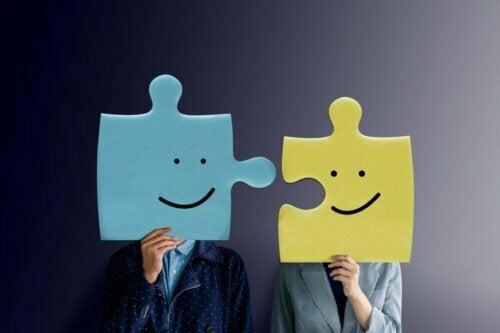Normality and strangeness are two of the most ambiguous concepts. However, they’re used a great deal on a daily basis. For example, we’ve all heard or even made statements like “Why can’t I find a normal partner?”, “Don’t look for friends on the Internet, there are only strange people on there” or “He’s a really strange person, he doesn’t talk to anyone”. However, what do we mean by these terms? As a matter of fact, they tend to mean different things to different people, hence we don’t have the power to judge who are normal people and who aren’t.
One of the biggest concerns we all share is fitting into society. In fact, our species needs interconnection with others to survive and develop. Consequently, being criticized, rejected, or isolated by others can cause serious damage to your self-esteem. On the other hand, forcing yourself to conform to a mold imposed by the outside is a sure path to unhappiness. Therefore, why do we all go out of our way to label people? Why do we seek to homogenize ourselves when each of us is complexly unique?
Who are normal people?
If we stick to semantics, normal is defined as that which conforms to the norm. In other words, that which meets the most common or usual characteristics, without exceeding or lacking them. Thus, we usually consider normal people to be those who conform to what’s socially expected by their social environment.
Practically from the moment you’re born, you’re evaluated based on this supposed normality. For example, if a baby takes a little longer than normal to start walking or say their first words, the environment criticizes and the parents worry. However, if a child is more curious and intelligent than the average, they also become the object of criticism and curious stares.
As you grow up, the judgments and standards continue. You’re told you must get good grades, have an active social life, maintain a relationship, find a good job, get married, have children… and all this to be carried out at a specific time that society considers suitable. The price of not complying with any of these steps? Being considered weird and on the receiving end of constant questioning.
The danger of seeking normality
In an effort to avoid deviating from these strict standards, you strive every day to fit in. If you’re shy, you force yourself to be sociable. If you hate your job, you still stay there. You suffer empty and harmful relationships for years because you’re afraid of what might be said if you split up. As a matter of fact, if you really stop and think about it, the pressure is stronger than you probably ever previously imagined.
The problem is that this kind of normality doesn’t necessarily fit in with your happiness or well-being. Nor does it mean that you’re able to grow and develop as an individual. It merely requires that you fit in. It doesn’t want you to be free and diverse, like brushstrokes on a mural, but homogeneous and constrained, like bricks in a wall.
The need to meet these external demands can make you sick, both physically and emotionally. It can cause anxiety disorders, depression, fears, frustration, and dissatisfaction as well as pain, discomfort, and psychosomatic disorders.
Those who venture outside the norm suffer rejection, and those who conform to it suffer restriction. Is this really what everyone wants?
Embrace your weirdness
The solution to this exhausting, painful, and unfair situation is in your hands and it involves opening yourself up to diversity. In fact, we all need to stop pigeonholing and categorizing ourselves and understand that we’re all different. Indeed, it’s these differences that enrich us as a society.
Introverts bring depth, extroverts bring joy. There are practical individuals and dreamers. There are those who love to listen, and those who are excellent communicators. Your dream may be to start a family while another wants to travel the world. Anything and everything is valid.
When you stop judging others, you also allow yourself the freedom to be. You discover that your goals might be what others set for you and that you’re rather different from what you pretended to be in order to gain approval. As a matter of fact, we’re all normal until we’re proven to be otherwise.
There’s no one who’s the same as you and that’s where your power lies. Embrace your weirdness and admire that of those around you. Remember, we’re all magically unique beings hopelessly struggling to appear normal.
The post We’re All Normal Until Proven Otherwise appeared first on Exploring your mind.


















Comments